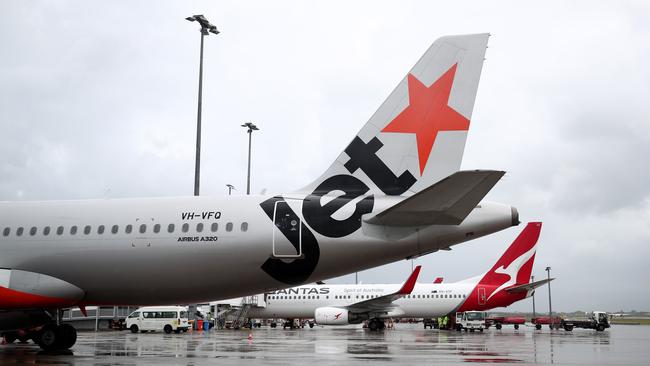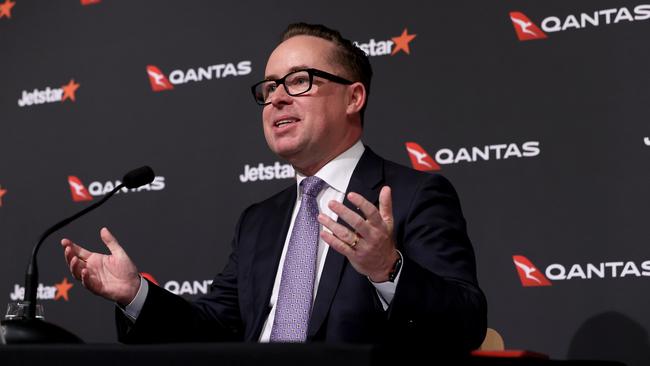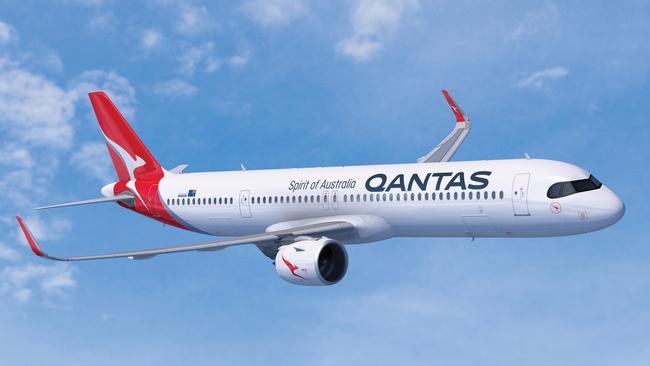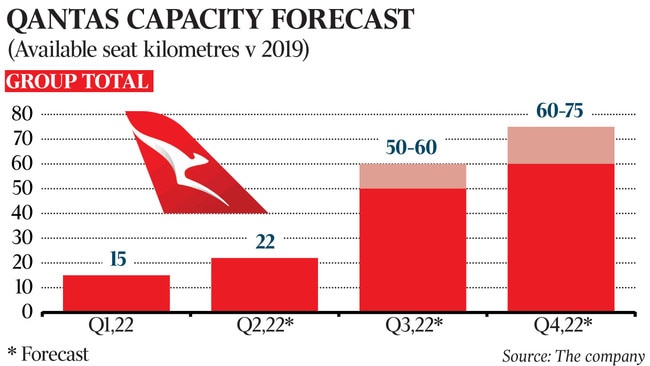Qantas orders 134 Airbus craft for domestic fleet amid expected $1.1bn half year loss in 2022
Qantas has lodged the biggest aircraft order in Australian aviation history as part of a decade-long domestic fleet renewal.

Qantas has lodged the biggest aircraft order in Australia’s aviation history with European manufacturer Airbus in a major blow to Boeing and its tainted 737 Max model.
The decision comes as Qantas prepares for a return to normal flight capacity, with chief executive Alan Joyce tipping international travel will re-emerge in the March quarter.
The 134 A320neo and A220 jets will replace Qantas’s existing domestic fleet of Boeing 737s and 717s over the next decade.
Considered the workhorses of the Qantas fleet, the Boeings have an average age of 14 years. Along with the 165 aircraft on order from Jetstar, the Qantas Group will have the option to take delivery of up to 299 aeroplanes from Airbus, leaving Boeing out in the cold.
Qantas boss Alan Joyce said it was a close competition between the two big manufacturers and Brazil’s Embraer to refresh the airline’s hardworking domestic fleet.
“We were comfortable with all the aircraft in the mix. I think the Max is a great aircraft. Boeing fixed the issues relating to the Max and we wouldn’t have been considering it if we didn’t think that aircraft was safe to operate,” Mr Joyce said.
“If Qantas had bought those aircraft people would’ve regarded them as safe, as I think the rest of the world does.”
A spokesman for Boeing said they respected Qantas’ decision and looked forward to continuing their longstanding partnership.
“Boeing aeroplanes including the 787 Dreamliner serve a significant role at Qantas and we will continue to partner with the airline to support its fleet,” he said.

The announcement came as Qantas unveiled an expected loss in excess of $1.1bn for the first half of the 2022 financial year due to the crippling effect of the Covid crisis.
The figure was just above that recorded for the 2021 first half, and Mr Joyce said the current six months had been the worst of the pandemic for the airline, with domestic flying across Qantas and Jetstar reduced to just 18 per cent of pre-Covid levels.
“We think by April Jetstar will be back to 120 per cent and Qantas will be around 115 per cent, and by June international flying will be up around 50 per cent. That’s light years away from where we were in this first half,” he said.
“You always have to be on edge when it comes to Covid but every indicator is positive: the vaccine levels, the effectiveness of the vaccine against Omicron. We’re seeing huge pent-up demand in the domestic market with the premiers now saying they want to move on and live with this.”
Despite the reduction in flying in the first half, Qantas had managed to reduce net debt from $5.9bn in June to $5.65bn, thanks in part to the sale of land at Mascot for $802m.
The strategy for 2022 would be to generate positive cashflow from flying, before an expected return to profitability in 2023, Mr Joyce said.
Qantas Loyalty and Qantas Freight both continued to make money for the group, and new international routes to Delhi and Rome were showing every sign of being very successful for the airline.
Mr Joyce said the services were aimed at making the most of huge demand for “visiting family and friends” with more business-oriented overseas routes to be added next year.
“Actually our strongest bookings are on the Johannesburg flights in January. The government is allowing people to travel there, so we’re going,” he said.
“It is family and friends going to see their relatives over there. They’re extremely strong loads and they haven’t cancelled.”

The domestic fleet renewal, due to start unfolding in 2024, would present more opportunities for network expansion.
Qantas chief financial officer Vanessa Hudson said the largest model of the A320neo family, the A321XLR, and the smaller A220 offered greater range and fuel efficiency than the aircraft now operating on domestic routes.
“The 220 will replace 20 Boeing 717s we’ve had in our fleet for some time and they will provide 24 per cent more seats, and they’re 20 per cent more fuel efficient,” Ms Hudson said.
“They have double the range of the 717 so you could see us being able to operate a 220 between Brisbane and Broome, Perth-Brisbane, Adelaide up into north Queensland.”
Airbus chief commercial officer and head of international Christian Scherer said the Qantas order had put the airline on a course to operate “one of the most modern, sustainable and fuel-efficient fleets in the world”.
“All this while offering its passengers the highest levels of aircraft cabin comfort in both the domestic and regional market segments,” Mr Scherer said.
“We look forward to delivering the new Qantas fleets and to working together with this world class airline.”

Australian travellers will get the opportunity to fly in the Boeing 737 Max when Virgin Australia takes delivery of 25 Max 10 aircraft from mid-2023.
New low-cost carrier Bonza also plans to operate Boeing 737 Max 8s when it takes off from mid-2022.
The aircraft was grounded worldwide in 2019 after two fatal crashes and returned to service late last year following extensive software modifications.






To join the conversation, please log in. Don't have an account? Register
Join the conversation, you are commenting as Logout